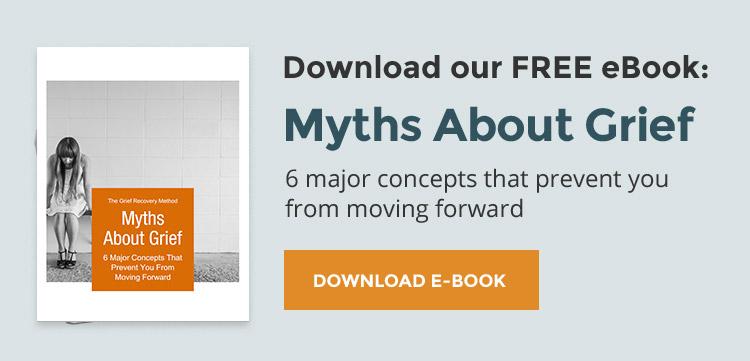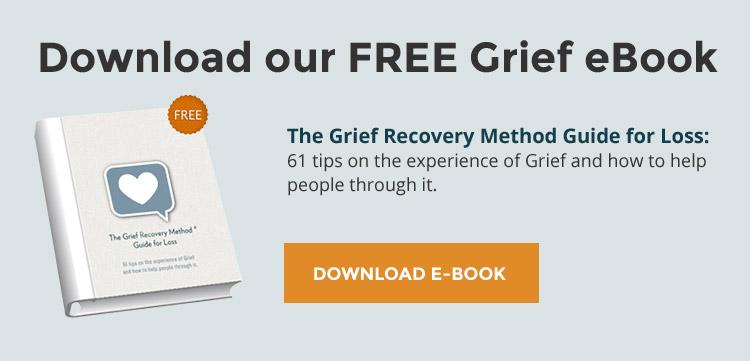
Have you ever said "I'm fine" when nothing could be further from the truth?... So have we so you're in the right place! A common thread running through some of the articles we have written is the misinformation we were all subjected to about processing the normal emotions caused by loss. We do not want to create any new loss issues by blaming our parents in particular or society in general for having passed on ineffective ideas, skills, and tools for dealing with loss. All we want to do is help establish that what we have been using to process our sad, painful, or negative feelings hasn't worked, and that we need to acquire more effective tools for dealing with loss events. Much of the incorrect information we learned and practiced may have convinced us not to show our REAL feelings at any cost. We were taught to bury any feelings that dealt with sadness. We were taught: "Laugh and the whole world laughs with you, cry and you cry alone." This and hundreds of other clichés about dealing with sad feelings taught us to lie about how we felt. And even the lying was protected under other misinformation like: "Don't burden others with your feelings."

I'm fine!
When we make public appearances we often ask large audiences this question: "Do you like being lied to?" Of course no one says yes. Our next question is: "How many of you have ever said 'I'M FINE' when you were feeling terrible?" Every single hand in the audience goes up. Conclusion: Nobody likes being lied to...and everybody lies about their feelings. If this were a physical illness it would be an epidemic and the Center for Disease Control would be granted billions of dollars to find a cure. Every time we lie to others we lie to ourselves. Our subconscious mind hears the lie and continues to bury the feelings generated by the initial event. Unresolved losses are cumulative, and cumulatively negative. Time does not heal the pain caused by loss and neither does lying about our feelings. It would be impossible to cure such a massive problem in a single blog, but let's try for a little bit of recovery. Allow yourself to believe that the subconscious will take actions based on conscious commands. When we lied and said we were fine, we told it that there was no problem so it need not search out a solution. The net effect is to allow the cause of the problem to go unattended and rebury itself. The next time it attacks we may not be able to recognize the cause or source of the attack.
Tell the truth about how you feel!
A major key to recovery is to process every feeling in the moment you have it. It does not require any special skills to tell the emotional truth about what you are feeling. For example: "How are you?" ... "I'm having a tough day, thanks for asking." Notice that the answer is truthful but does not invite any help or advice. It also has the capacity of serving notice that you are not on your game and the other party can respond accordingly. When you say "I'm fine," but you're not, you have sent a very confusing message.
QUESTION: Sometimes I tell people "I'm fine" and they don't believe me. Why not?
ANSWER: Approximately 20% of your ability to communicate is verbal, leaving about 80% as nonverbal. Nonverbal communication includes tone of voice as well as facial and body signals. When our verbal and nonverbal signals do not match, most people will respond to the nonverbal. So when you lie, most people can SEE it.
If you found this article helpful, we suggest you read Emotional Muscle Memory
Click here to find a Grief Recovery Method Support Group in your community!
Photo Credit: 123RF Stock Photo - stuartphoto

























Comments
Phyllis Garrett
These are some of the most poignant articles I have found on the grieving process. I have been a nurse for greater than 29 years and knew nothing of grief until I lost my child three years ago. I pondered on the stages of death what I had been taught about the subject as a student and what I had shared with the families of patients lost during my career. I felt like a hipocrit. The truth was there were no stages there was no one to be angry with not even the men who killed my son. I was caught up in an overwhelming gamut of emotions unable to distinguish any stage so rapidly transitional was the movement of emotions. Thank you for the insightful information.
Brian Thomas
I recently broke up with a woman who I very much loved, and the book has helped me out considerably. The biggest thing I have learned through this process is people are clueless when it comes to dealing with grief and it is a very wide variety of problems the person in pain faces when dealing with anyone, because it is such a difficult thing for someone not in this position to process. I am waiting for the Atlanta Seminar in Sept. to begin so I can learn how to help people to get their mind and hearts back. This training is unque and a must.
Russell Friedman
Hi Brian,
We noticed that you commented on a few of the articles - thank you. But we wanted to respond to this one because you point out one of the biggest problems facing grievers - that is that most of the people around them DO NOT know how to react to them, nor how to help them. It's not because people are mean or insensitive, it's because they can only do what they have observed over their lives, and much of what they saw and heard was not helpful in regards to grief. We're really pleased that you're going to attend the Atlanta Grief Recovery Method Certification training. Warm regards, Russell and John and the Grief Recovery Method team.
cathy ballard
I have read several of the articles and still did not see any that deals with muiltiple deaths. I lost my first son at the asge of 24. I lost my second a nd third son by suicide 8 years apart.i have been devastated by this.
Russell Friedman
Hi Cathy,
We tend not to use the phrase, “multiple deaths” as it can set up ideas that can limit people in terms of seeking recovery. We’ve know people to overwhelm and paralyze themselves into non-action by using that language.
Instead, we guide griever people to focus on the content and uniqueness of each relationship.
It’s also important to take the actions of the Grief Recovery Method as soon as possible after the death of someone meaningful to you. That way, to some degree, you can limit the cumulative emotional damage you feel, especially in circumstances like yours.
That is not to say that you wouldn’t be devastated by the deaths of your sons, not to mention what it’s been like for you to adapt to the fact that two of them committed suicide.
When you start the actions of Grief Recovery, we suggest that you stop using the idea of multiple deaths and think in terms of the individual relationships you had – and to some degree still have – with each of your three sons who died.
From our hearts to yours,
Russell and John and the Grief Recovery Method Team
Ashli
Five days ago my 16 year-old son was walking down the street with his best friend when his friend was hit by a drunk driver. My son held his friend until he died. He believes that when he talks about his pain it only makes him feel worse and so does not want to talk at all. He told me that though people may have experienced similar situations they can not understand how he feels as he felt his friend's heart stop. He is constantly saying he's fine, though he will on occassion tell me if it's particularly bad, but will go no further. He has refused all offers of counseling. Can you direct me to a specific article that I can read and/or pass on to him that may help him? I know 5 days isn't a lot of time, but even his friend's parents are calling me stating how worried they are. I've kept him home from school all week, though he did attempt one day and could only make it through one class. At what point should I try to put the normalcy back in his routine? Any advice would be much appreciated.
Thank you.
Russell Friedman
Dear Ashli,
Thanks for your note and request for guidance.
The issues at hand for your son [and you] are a little too involved and important to try to answer in writing.
Please call me at 800-334-7606, Ext 12. I will be here all next week. If I don't answer, please leave a message and I will call you back.
Between now and when you and I speak, please go to the library or bookstore and get a copy of "When Children Grieve." Although your son is 16, there is a great deal in the book that will help you guide him as the crucial aftermath of this tragic event unfolds.
Waiting to hear from you,
Russell
Mary Ellena Schnoor
Mary Ellena Schnoor
stephen moeller, grief recovery specialist
Add new comment